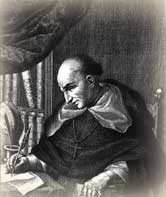Las Casas, Sepulveda
and the Great Debate
by Ronald A. Barnett
Part Two
In 1550-1551 a public debate was held in Valladolid, Spain, between Las Casas, chief spokesman for the Indians of New Spain, and his opponent, Sepulveda, who regarded the Indians as subhuman and therefore subject to the superior races–slaves; Indians committed crimes against nature, namely idolatry, sodomy, and cannibalism; Indians sacrificed innocent people in sacrificial rites; finally, Indians were infidels who could be converted to Christianity only by force.
Las Casas countered first with a four-part definition of barbarism. Then he argued that the Indians of New Spain did not fall under Sepulveda’s definition of barbarism and were therefore, not inferior to civilized peoples nor were they necessarily subject to the superior races. Moreover, Aristotle’s Theory of Natural Slavery, invoked by Sepulveda did not apply to the Indians of New Spain because the Indians lived in harmonious and organized communities and had a form or written language, although as pagans, they needed help from the Spaniards to save their souls.
Las Casas’ main defense of the Indians and the most difficult part of his argument involved idolatry, human sacrifice, and the use of Biblical scriptures in the Great Debate. Las Casa began by declaring that the Indians, while admittedly pagan, could not be classified as heretics who had dissented against the Roman Catholic faith. Consequently, Indians did not fall under the jurisdiction of Pope Paul III or King Charles V and so could not be punished for crimes against nature, including idolatry or human sacrifice. This counter-argument was particularly important because the early Conquistadores and Spanish missionaries were so horrified at the worship of what they regarded as “idols” and the Aztec practice of human sacrifice that they felt perfectly justified in dealing with the Indians in any way they saw fit.
The cultural gap between the Spaniards and Indians was so wide that the Spaniards could not possibly understand, much less accept, the Aztec concept of human sacrifice as a means of preserving the universe. Furthermore, Spanish missionaries were greatly perplexed by the similarities between many Aztec practices and the rites of the Catholic church. For example, the Eucharist of the Catholic church and the Aztec concept of ixiptlatl had much in common, for they both involved a form of personification. In the former, the bread and wine were not simply symbols of the body of Christ, but the actual flesh and blood of Jesus (transubstantiation), at least for devout Catholics, in the latter the priest who danced in the skin of the flayed human sacrifice personified the deity he was representing (ixiptlatl) at least in the minds of the believers. The Spaniards regarded the Aztec practice as sinful idolatry. The only difference was that the Spaniards had the weapons to convince the Aztecs they were wrong and that the Spaniards were right.
Las Casas’ response was crucial to his whole defense of the Indians, for it involved acknowledging, if not justifying, idolatry and human sacrifice as it was practiced by the Aztecs. Granted that human sacrifice is wrong, so the argument went, it can nevertheless, perhaps be explained by the circumstances in which the Indians found themselves during the 16th century. In any case, the Indians were pagans, not heretics and were therefore to be converted to Christianity by peaceful means and not violently punished for their lack of faith in the Catholic church. Here Las Casas made perhaps his greatest concession as a Dominican priest, for he acknowledged that idolatry and human sacrifice were lesser evils than war, which should be avoided at all cost. The Indians were evolving and therefore needed to be converted, not killed, thus overturning Sepulveda’s previous argument that war was necessary to convince the Indians because in the Bible Jesus is said to have forced guests to attend the wedding feast. Las Casas replied that while the Bible could indeed be interpreted in different ways one should not completely distort the meaning of the scriptures.
The Great Debate ended in 1551. The terms of the discussion were highly academic and theoretical and did not deal with native culture in its own context. Moreover, the Indians were never included in the debate. Sepulveda continued as a spokesman for the encomienda system of slavery in New Spain, while Las Casas became known as the defender of Indians. However, as D. Castro points out in Another Face of Empire, Las Casas did indeed come to the defense of the Indians against the torture and murder of natives by the Spaniards but in fact he was simply substituting another form of paternalistic, ecclesiastical imperialism in place of military, economic and political domination.
Sepulveda never visited the Americas but his arguments in the debate with Las Casas reflected actual practices in the Spanish conquest of the Americas. His work was suppressed from an early time because he told the truth about the racial intolerance and dirty practices of the Conquest. InDemocrates Segundo Sepulveda expressed the general attitude of the Spaniards toward the Indians: “(The Indians are)…naturally lazy and vicious, melancholic, cowardly, and in general a lying, shiftless people. Their marriages are not a sacrament but a sacrilege. They are idolatrous, libidinous and commit sodomy. Their chief desire is to eat, drink, worship heathen idols and commit bestial obscenities. What could one expect from a people whose skulls are so thick and hard that the Spaniards had to take care in fighting not to strike on the head lest the swords be blunted.”
One way or another, the natives of the Americas were destined to be subject to the will and whims of the ruling Europeans. The Spaniards who followed Sepulveda continued with their aggressive policies. Only a few actually adopted more peaceful methods of conversion but as far as the Indians were concerned no real change resulted.




